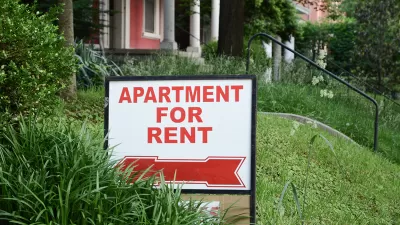A decade after an epochal shift in the housing market, the country is changing again.

The Joint Center for Housing Studies of Harvard University released a report on rental housing this week, headlining the findings of the report with the conclusion that a decade of unprecedented growth in the rental housing market "may be coming to an end."
"Fewer new renter households are being formed, rental vacancy rates have risen, and rent increases have slowed," according to the website announcing the report. "At the same time, renter demographics are changing and nearly 21 million households continue to pay more than 30 percent of their income for rent."
The news of the new study got picked up Diana Olick at CNBC, who focuses on the study's findings about renters in the country becoming older and wealthier. "The number of higher-income rental households has doubled in the last decade," writes Olick, "and that trend will likely increase in the coming years as more baby boomers downsize."
Kriston Capps also shared news of the new report, noting that the "explosion of renters" since the foreclosure crisis has finally begun to fade. According to Capps, however, "even though the expansion of the renter class may be slowing, the changes in rental housing, and in the people who choose to rent, are here for good."
Announcements from the launch event and commentary on the findings of the report are also being catalogued on Twitter at #harvardhousingreport.
FULL STORY: AMERICA'S RENTAL HOUSING

Alabama: Trump Terminates Settlements for Black Communities Harmed By Raw Sewage
Trump deemed the landmark civil rights agreement “illegal DEI and environmental justice policy.”

Planetizen Federal Action Tracker
A weekly monitor of how Trump’s orders and actions are impacting planners and planning in America.

The 120 Year Old Tiny Home Villages That Sheltered San Francisco’s Earthquake Refugees
More than a century ago, San Francisco mobilized to house thousands of residents displaced by the 1906 earthquake. Could their strategy offer a model for the present?

In Both Crashes and Crime, Public Transportation is Far Safer than Driving
Contrary to popular assumptions, public transportation has far lower crash and crime rates than automobile travel. For safer communities, improve and encourage transit travel.

Report: Zoning Reforms Should Complement Nashville’s Ambitious Transit Plan
Without reform, restrictive zoning codes will limit the impact of the city’s planned transit expansion and could exclude some of the residents who depend on transit the most.

Judge Orders Release of Frozen IRA, IIJA Funding
The decision is a victory for environmental groups who charged that freezing funds for critical infrastructure and disaster response programs caused “real and irreparable harm” to communities.
Urban Design for Planners 1: Software Tools
This six-course series explores essential urban design concepts using open source software and equips planners with the tools they need to participate fully in the urban design process.
Planning for Universal Design
Learn the tools for implementing Universal Design in planning regulations.
Clanton & Associates, Inc.
Jessamine County Fiscal Court
Institute for Housing and Urban Development Studies (IHS)
City of Grandview
Harvard GSD Executive Education
Toledo-Lucas County Plan Commissions
Salt Lake City
NYU Wagner Graduate School of Public Service





























